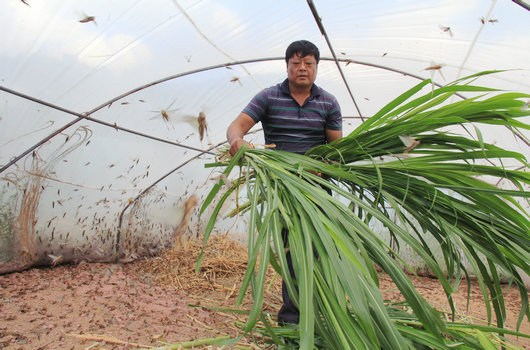
Su Shaoyin, a villager in Yangbi County, Yunnan Province, raises locusts. (Photo: yn.people.com.cn/Yang Guiqing)
As the first ray of sunshine reaches Damojing Village, Zhu Jinlian wakes up, puts on his clothes and braces against the wind as he makes his way to a shed.
There are noises coming from the ryegrass under his feet. Zhu bends down to grab a handful of grass and sweeps something into a corner before putting it into a bag.
Slowly, his bag is filled with locusts.
Weighing around 6.8 kilograms in total, the insects earn him 272 yuan (41 U.S. dollars) -- a lot of money for Zhu. The 40-year-old farmer is more than 30,000 yuan in debt from paying for his children's education and his elderly mother's medical bills.
For more than 4.47 million people living below the poverty line in southwest China's Yunnan Province, making better lives for themselves is complicated. It means building roads and bridges, planting fruit trees and herbs, seeking jobs in cities, and even raising locusts.
"When the local government launched the program in 2015, I didn't believe that raising locusts, a pest that we previously hated, could make money," said Zhu.
Locusts are believed to have high nutritional and medicinal value in many parts of China. The bugs fetch a wholesale price surpassing 40 yuan per kilogram.
Around 2,500 meters above sea level, Damojing is a poor, remote village in Yunnan. Of its 931 villagers, more than 22 percent survive on an annual income of less than 2,952 yuan per capita.
Raising locusts does not require much skill or labor. It's an easy way to make money for poorly educated farmers.
"Considering these reasons, we realized it might be a way out of poverty," said Zou Xiangping, a poverty-relief cadre with the village.
Zhu's family did not have any source of income beyond a small plot of farmland. They lived in an old house with cracked mud walls. Zhu decided to try locusts.
Building a shed and purchasing young locusts requires an investment of 5,000 yuan. With the help of the government, he paid one third of the cost, received free training with another 100 villagers and visited a pilot locust farm in Kunming, capital of Yunnan.
The local government has signed agreements with firms to help poor villagers sell their locusts to buyers from big cities such as Guangzhou and Shanghai.
So far, a total of 18 village households, including eight registered poor households, have participated in the program. They can produce more than one tonne of locusts each year.
By raising the insects, Zhu expects to earn over 30,000 yuan this year. The family of five already moved into a new house in August.
"There is no problem in paying off my debt," he said.
As one of the poorest provinces in China, Yunnan has more than 10 percent of China's officially designated poor counties, including the Hui and Yi Autonomous County of Xundian, where Zhu lives.
According to He Jinping, deputy governor of Yunnan, the province set this year's target to help one million people cast off poverty.
It has worked to improve infrastructure, develop industrial projects, ensure equal access to basic public services, and mobilize enterprises and government agencies to offer support to poor villages.
"Lifting all the remaining poor people out of poverty is a solemn commitment made by the Chinese government to the people. It is uppermost in my mind, and I have spent more energy on poverty alleviation than anything else," said Chinese President Xi Jinping in a keynote address at the Asia-Pacific Economic Cooperation (APEC) CEO Summit last week.
Over the past five years, Xi has been to many poor areas in China to identify the causes of poverty and address them in a targeted way.
Decisive progress has been made. More than 60 million people have been lifted out of poverty in the past five years in China, with the the poverty rate dropping from 10.2 percent to less than 4 percent.
Yang Shujun, deputy Party chief with Xundian, cited a Chinese proverb relevant to the current poverty reduction efforts: Give a man a fish and you feed him for a day; teach him how to fish and you feed him for a lifetime.
Xundian aims to lift its remaining 46,000 residents out of poverty this year by developing industries including locusts, chickens, potatoes and flowers.
Zhu plans to build another three locust sheds next year.
"The pest has become a boon for us in the fight against poverty," he said.


















































